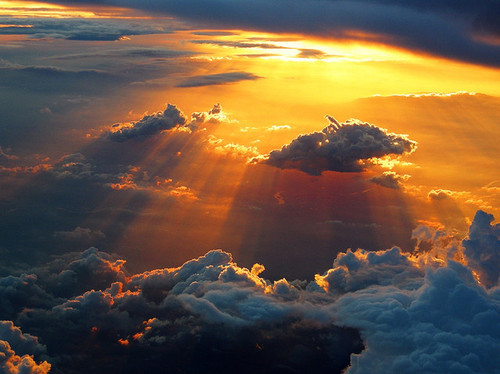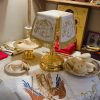“Such beauty has power,” Adelaida said hotly. “You can overturn the world with such beauty.”
–The Idiot, by Fyodor Dostoevsky
Perhaps the most famous phrase from Fyodor Dostoevsky’s quite voluminous body of writing is the statement that “beauty will save the world.” Much ink has been spilled concerning this phrase by all manner of critics and commentators, both Orthodox and non-Orthodox alike. And without doubt it is extremely important that we Orthodox put due emphasis on the centrality of beauty in our faith — perhaps especially those of us who are children of the West, having all too often inherited an understanding of Christianity which is prone to a cold legalism and an abstract moralism. Such an emphasis on beauty must occur not only in our worship and our theology (after all, in both cases this has already largely been done for us), but also in the inward struggle of each of our own spiritual lives.
But how exactly are we to do so? When we come down to it, this is not exactly an easy question. And indeed, for Dostoevsky beauty was not nearly so straightforward a subject as a cursory reading of his famous quotation might lead one to believe.
And in point of fact, Dostoevsky himself never actually said that “beauty will save the world.” The phrase appears a handful of times in his novel The Idiot… and yet the titular character, Prince Myshkin, also never says it; rather, it is attributed to him at several points by various other characters. What we do hear Myshkin say concerning beauty is something rather different and more nuanced: “Beauty is difficult to judge; I’m not prepared yet. Beauty is a riddle.” It is a riddle (I do not want to give away too much of the book) that nearly destroys him.
Dostoevsky returns to this theme in his magnum opus, The Brothers Karamazov, in the course of which Dmitry Karamazov speaks what is in my opinion one of the most profound paragraphs in all of literature:
Beauty is a fearful and terrible thing! Fearful because it’s undefinable, and it cannot be defined, because here God gave us only riddles. Here the shores converge, here all contradictions live together… Beauty! Besides, I can’t bear it that some man, even with a lofty heart and the highest mind, should start from the ideal of the Madonna and end with the ideal of Sodom. It’s even more fearful when someone who already has the ideal of Sodom in his soul does not deny the ideal of the Madonna either, and his heart burns with it, verily, verily burns, as in his young, blameless years… What’s shame for the mind is beauty all over for the heart. Can there be beauty in Sodom? Believe me, for the vast majority of people, that’s just where beauty lies—did you know that secret? The terrible thing is that beauty is not only fearful but also mysterious. Here the devil is struggling with God, and the battlefield is the human heart.
And indeed the struggle has been long and terrible, and the battlefield is strewn with many corpses of the slain. Let us not forget that it was precisely beauty that overthrew our First Mother Eve in the Garden; it was precisely beauty that brought about the Fall of Man. “And when the woman saw that the tree was good for food, and that it was pleasant to the eyes, and a tree to be desired to make one wise, she took of the fruit thereof, and did eat” (Gen. 3:6). Let us also not forget that even “Satan himself is transformed into an angel of light” (2 Cor. 11:14).
Just as the most dangerous lies of the devil are those which are hidden among half-truths, so too the most terrible horrors of sin are those which are hidden under a veneer of beauty. This is precisely what St. Augustine warns us about — from his own bitter experience — in his incomparable work The Confessions: “For whithersoever the soul of man turns itself, unless toward Thee, it is riveted upon sorrows, yea though it is riveted on things beautiful.” Yet this warning of the saint also reveals to us the way of escape: we must turn our souls not simply toward that which is beautiful, but toward the beauty which it is only possible to behold in the Lord God Himself.
In short, we must become ascetics.
It might seem strange to say that the only way to build our lives around true beauty is through the path of ascetic renunciation. But if this is so, it is only because we do not understand what asceticism really is. That we have difficulty understanding asceticism should not surprise us, for as St. Ignatius Brianchaninov writes in The Field: “The Fall has become so assimilated to the essence of all mankind that rejection of the Fall has become tantamount to rejection of our very life.” For us darkened sinners and spiritual infants, the beginnings of the ascetic life no doubt feel quite painful and profoundly unnatural.
But though this may seem to be so, the truth is that asceticism is infinitely far from being some dour exercise of medieval self-flagellation. We do not undertake ascetic labors in order to deprive ourselves of good things, or to somehow punish ourselves for the sake of God. No, we undertake ascetic labors in order to teach ourselves to no longer be satisfied with what is merely earthly and fleeting, to reorient our hearts toward eternity, to seek above all other things the incomparable beauty of the Kingdom of God. We become ascetics not in order to close off our hearts, but rather to open them.
The great 19th century God-bearing Elder, St. Barsanuphius of Optina, explained this when some pilgrims came to ask him whether Christians ought to spend their time going to the symphony. The Elder had greatly loved music before he entered the monastery, and so he was able to affirm that some of these works are indeed beautiful and edifying. But he also pointed out that the human heart only has so many “valves,” so to speak. The more of these valves we open to earthly beauty, the less room there is for spiritual beauty to enter into our hearts. And conversely when we close off our hearts to earthly good things, we open them all the more to be filled with spiritual good things.
My brothers and sisters, generally speaking our hearts today are small and withered. Yet they are stuffed to overflowing — as never before in all the history of the world — with an overwhelming multitude of both cares and pleasures of this life. How will we create room in them for God, for the Mother of God, for the saints, for one another? There is quite simply no other way to do so than the way of the ascetics.
As I said, when we first set out on this path it will no doubt be difficult, and the demons will do their utmost to make it seem both unnecessary and joyless. And that is why, when undertaking our small labors of asceticism, we must constantly call to remembrance the purpose of this asceticism: through leaving behind that which is paltry and perishing, to lay hold already in this life on the true joy and true beauty which can only be found in the Kingdom of God.
If any doubt my words, I urge them to read the book Wounded by Love (actually, I urge every Christian to read it anyway), which explains all of this much better and much more beautifully than I possibly could. But even more than this wondrous book, St. Paul in the 12th chapter of Hebrews offers us to greatest possible proof of the glory of the ascetic path:
Wherefore seeing we also are compassed about with so great a cloud of witnesses, let us lay aside every weight, and the sin which doth so easily beset us, and let us run with patience the race that is set before us, looking unto Jesus the author and finisher of our faith; who for the joy that was set before Him endured the cross, despising the shame, and is set down at the right hand of the throne of God.
Of course, like St. Barsanuphius we do not need to deny the authentic goodness and beauty that exists in this world, nor do we automatically need to cut ourselves off from it entirely. Even St. Isaac the Syrian, who was by no means a stranger to strict and rigorous asceticism, declares that Nature is one of two books (alongside Holy Scripture) through which God reveals Himself to man. And this, in the final analysis, is the true criterion by which Christians must judge beauty: is it leading us toward God? Is it drawing our hearts toward heaven?
Even Ippolit — the angry, dying, revolutionary nihilist in Dostoevsky’s The Idiot — knew what question to ask Prince Myshkin about the famous phrase: “What beauty will save the world? Kolya told me what you said … Are you a zealous Christian? Kolya says you call yourself a Christian.”
What beauty will save the world? Only the beauty of Christ. Only the beauty of the Cross.
“Let us cleanse our senses, and we shall behold Christ shining with the unapproachable Light of the Resurrection.” – Paschal Canon

















